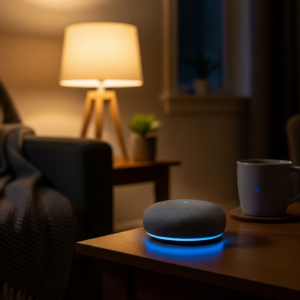Last updated on October 1, 2025

Smart speakers like Alexa, Google Home, and Siri are everywhere, helping us play music, set reminders, and control smart devices. But these convenient gadgets can also pose serious privacy risks.
Here’s what you need to know:
-
Always-On Listening
Smart speakers are designed to listen for their wake word, but sometimes they may accidently start recording if they mishear other sounds as the wake word. These recordings are often stored in the cloud and can usually be reviewed or deleted in your account settings. They may be accessible if your account is hacked.
-
Data Stored in the Cloud
Your voice commands and device interactions are not just on the speaker they’re stored online. Hackers or unauthorized parties could gain access to this data if security measures are weak.
-
Third-Party Apps Can Collect Data
“Skills” or apps you enable on smart speakers may collect personal information such as your habits, preferences, or even sensitive details from conversations. Only use trusted apps and review permissions carefully.
-
Potential Risks
- Privacy intrusion through recorded conversations
- Potential for identity theft or financial fraud if accounts are compromised
- Unintended sharing of personal or family information
-
How to Protect Yourself
- Use the mute button when private conversations happen
- Regularly review privacy settings and delete or auto-delete old voice recordings
- Ensure your Wi-Fi network is secure with a strong password
- Be cautious with third-party apps – only enable trusted ones
- Teach family members about privacy awareness around smart devices
Smart speakers are helpful and fun, but they can silently collect more information than you realize. Taking these steps ensures you enjoy the benefits of technology without compromising your privacy.
References:
https://www.kaspersky.com/resource-center/threats/how-to-improve-your-smart-speaker-privacy
https://moxso.com/blog/how-smart-speakers-can-compromise-your-privacy

